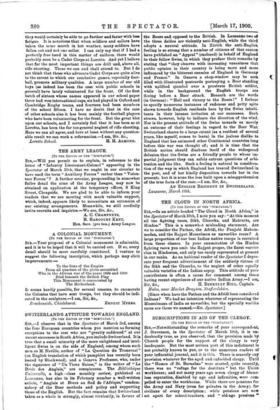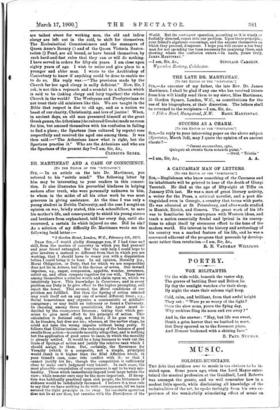SUBSCRIPTIONS IN AID OF THE CLERGY.
[To THE EDITOR OF THE "SPECTATOR:1
SIR,—Notwithstanding the remarks of your correspondent, J. Stevenson, in the Spectator of March 10th, it is un- doubtedly true, as you observed, that the provision made by Church people for the support of the clergy is very inadequate. But the most serious part of this indictment is not probably known to you, or to the numerous readers of your influential journal, and it is this. There is scarcely any provision whatever for the aged and enfeebled clergy. Until the " Homes of St. Barnabas" were started, quite recently, there was no "refuge for the destitute " but the Union workhouse; and not many years ago seven clergy of blame- less reputation, disabled by age and infirmities, were com- pelled to enter the workhouse. While there are pensions for the Army and Navy (even for privates in the Army), for civilians of every description ; while pensions are now set apart for school-teachers, and " old-age pensions "
are talked about for working men, the old and infirm clergy are left out in the cold, to shift for themselves. The Ecclesiastical Commissioners and the managers of Queen Anne's Bounty (1) and of the Queen Victoria Susten- tation (I) Fund, are all bound, or have bound themselves, by such bard-and-fast rules that they can or will do nothing. I have served in orders for fifty-six years. I am close upon eighty years of age. I wish to retire and give place to a younger and abler man. I wrote to the Archbishop of Canterbury to know if anything could be done to enable me to do so. His reply was :—" The provision made by the Church for her aged clergy is sadly deficient." Now, Sir, I ask, is not this a reproach and a scandal to a Church which is said to be (taking clergy and laity together) the richest Church in the world? The Wesleyans and Presbyterians do not treat their old ministers like this. We are taught in the Bible that respect is due to old age, and as a nation we boast of our charity, Christianity, and love of justice ! When, in ancient days, an old man presented himself at the great Greek games, the Athenians (the cultured Greeks) made no room for him, but amused themselves with his confusion in failing to find a place; the Spartans (less cultured by repute) rose respectfully and received the aged one among them. It was then said :—" The Athenians know what is right, but the Spartans practise it." Who are the Athenians and who are the Spartans of the present day P—I am, Sir, &c., CLERICUS SENEI.

































 Previous page
Previous page